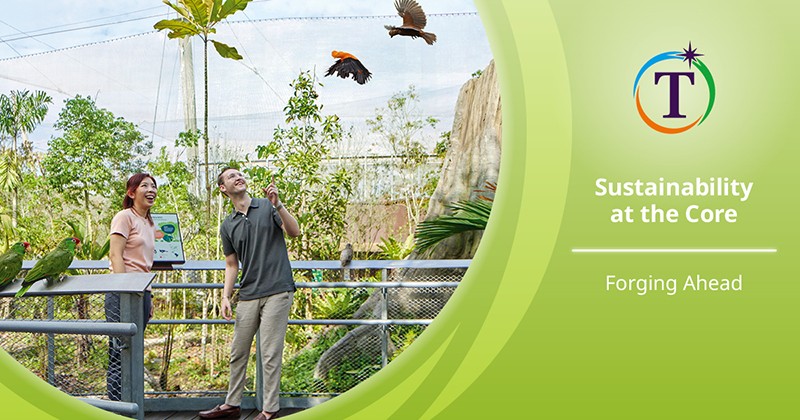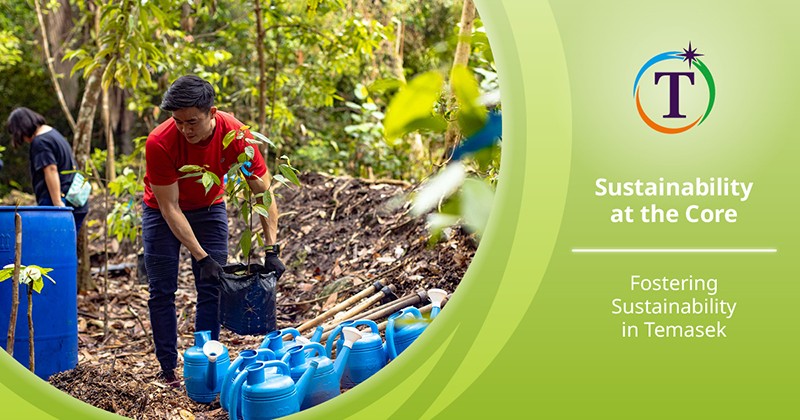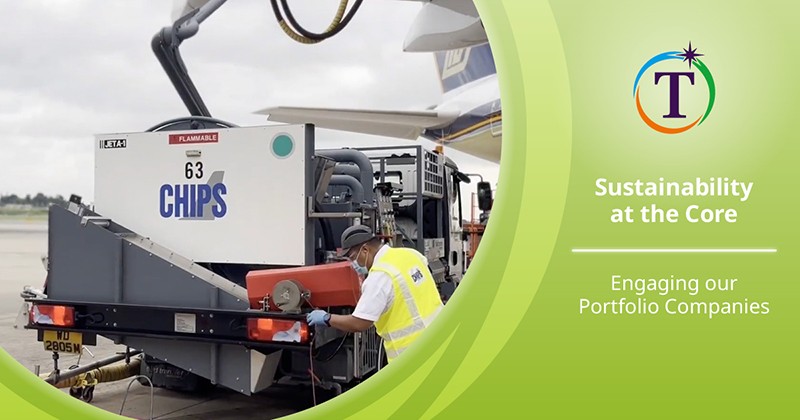Advancing Sustainability through our Portfolio
We believe that we can strive for a climate positive world, where no communities are left behind in the transition, while achieving sustainable value over the long term.
Jump to
Environmental sustainability, climate change mitigation, adaptation, and transition are not only critical levers towards a greener economy, but are also important in contributing towards delivering sustainable value over the long term. To remain steadfast in our resolve to accelerate decarbonisation globally, we have developed a climate strategy that is informed by science and the relevant policy and technology roadmaps.
We measure and manage our portfolio carbon emissions and integrate climate risks and opportunities into the way we originate and evaluate investments. We also pilot, invest in, and scale decarbonisation platforms and solutions.
Over the year, we accelerated our efforts along the three pathways identified to achieve our target of reducing the net carbon emissions attributable to our portfolio to half the 2010 levels by 2030 and our ambition to reach net zero by 2050:
-
Investing in Climate-Aligned Opportunities
We have been investing in climate-aligned opportunities, especially in early stage companies that offer disruptive ideas and business models in areas such as food, water, waste, energy, materials, clean transportation, and built environment.
Examples include our investments in Breakthrough Energy Ventures' new climate-focused fund Select, which will help late stage cleantech start-ups to scale and expand their operations; Fairmat, a France-based company that recycles carbon fibre waste into a usable and light carbon fibre composite; Hydrogenious, a Germany-based company that develops technologies and processes to enable safe, efficient, and cost-competitive transport and storage of hydrogen; and RWDC Industries, a Singapore and US-based start-up producing sustainable plastic alternatives.
We partnered funds and companies within our global network to drive investments and efforts that achieve environmental and social impact at scale. One of our partnerships is the incubation of Rize, an agri-tech start-up to accelerate rice decarbonisation in Asia, with Breakthrough Energy Ventures, GenZero, and Wavemaker Impact.
-
Enabling Carbon Negative Solutions
With growing awareness of nature’s role in climate change mitigation and adaptation, we have enabled carbon negative solutions, alongside emissions reduction efforts, to support mitigation of climate change.
On this front, GenZero, an investment platform company we launched in 2022, has made progress across three focus areas to accelerate decarbonisation globally: technology-based solutions, nature-based solutions, and carbon ecosystem enablers. They have been actively investing in companies such as Bluesource Sustainable Forests Company, a forestland owner in the US that develops nature-based solutions through sustainable forest management practices; CHOOOSE, a Norway-based company that offers a software to help companies build and manage their climate programmes; and Lightrock’s inaugural Climate Impact Fund targeting European and North American growth stage companies that are innovating towards a net-zero economy.
Temasek’s stake in Climate Impact X, a global marketplace and exchange set up with DBS, the Singapore Exchange, and Standard Chartered, was transferred to GenZero to enable stronger synergies across the carbon ecosystem.
-
Encouraging Decarbonisation Efforts in Businesses
Our long term investment horizon, which can span decades, puts us in a unique position to support companies to become more sustainable and adopt carbon abatement strategies.
Beyond deploying capital in start-ups and growth sectors, and partnering industries to pilot or scale sustainable solutions, we invest alongside portfolio companies as they transition their businesses, and regularly engage our major portfolio companies on their decarbonisation journeys including through our Climate Transition Readiness Framework, which brings together a holistic set of levers for the net zero transition and sets out a systematic approach for dialogue. This allows us to understand the challenges they face in the climate transition and opportunities to support and encourage them to decarbonise. This goes hand in hand with other ongoing efforts to ensure long term resilience and value creation within our portfolio.
In hard-to-abate sectors such as heavy industry and transportation, broader system and technology changes are required for a successful industry transition. We catalyse change and innovation by funding pilots, feasibility studies, and research programmes relating to novel solutions with potential to scale and commercialise. Such solutions include, for example, district cooling for brownfield buildings, and nature-based solutions such as blue carbon ecosystems.
We also play our part as a convenor for systems change, bringing together relevant stakeholders, including our portfolio companies, and committing capital to support R&D advancement. In July 2022, we established the Centre for Hydrogen Innovations in partnership with the National University of Singapore, with the aim of pushing the boundaries of technologies in the hydrogen value chain through research. The Centre has since funded nine projects focusing on technological and infrastructural challenges across the hydrogen value chain. It also works closely with industry partners and institutes of higher learning to further develop the hydrogen industry.
As we increasingly lean into the transition of the real economy, we are prepared to selectively invest in carbon-intensive businesses to help accelerate and increase certainty of their transition to net zero in line with climate science. As the emissions trajectories of such transition investments may differ from our core portfolio, we will track the emissions and targets of these investments separately while ensuring that the real-world emissions reductions are accelerated.
For instance, we are part of a consortium led by Brookfield Renewable Partners to invest in Origin Energy’s Energy Markets business, an Australian integrated power generator and energy retailer, to accelerate decarbonisation of the energy grid, retire coal generation responsibly, and enable the energy transition in Australia. This is expected to make a material contribution towards Australia’s net zero targets at a crucial time in its energy transition.
Another example is our investment in Sembcorp Marine which has recently merged with Keppel Offshore & Marine to form Seatrium. Their merger is expected to accelerate the group’s transition towards providing renewable energy and cleaner offshore and marine solutions.


